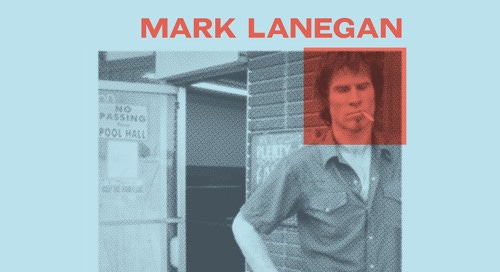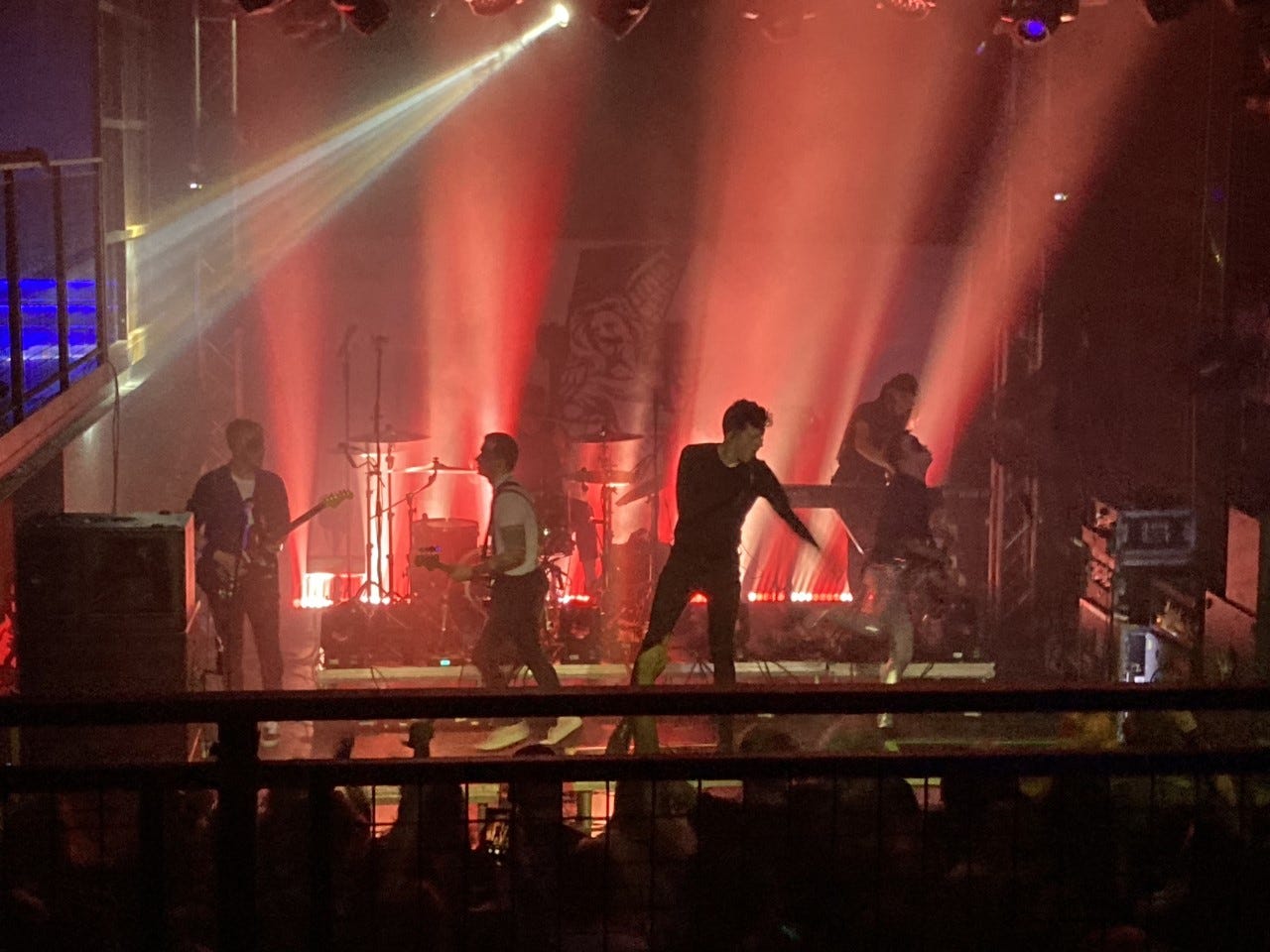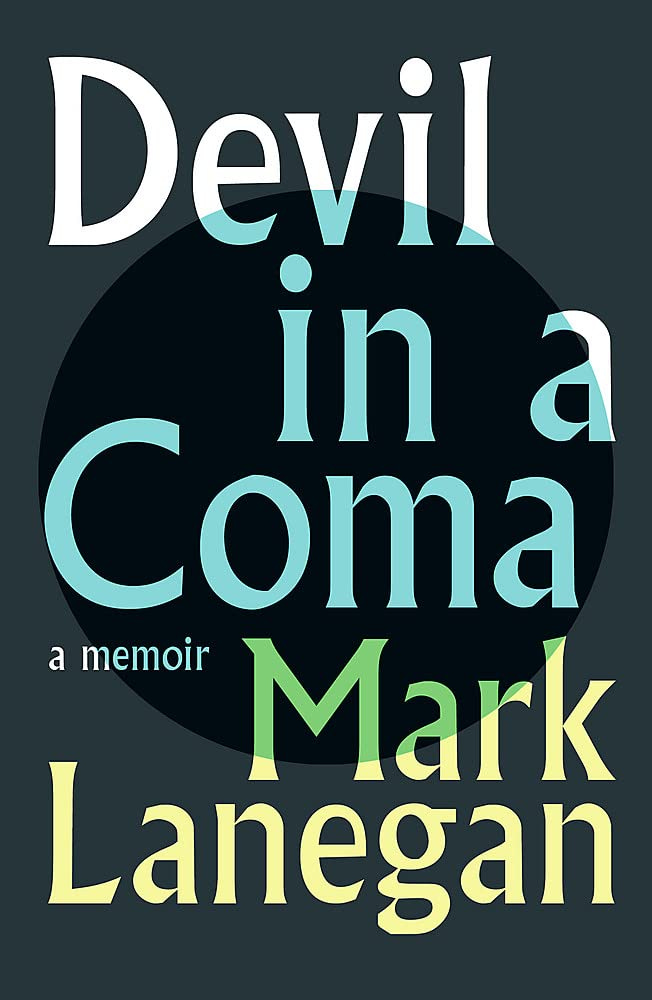Hello again!
I’m writer P M Buchan and you might have found me through my past comics with artists including Martin Simmonds and John Pearson, my former monthly columns for Starburst and SCREAM magazines, or through being interviewed by magazines like Kerrang! and Rue Morgue. After an abysmal 2021 I spent the last year hibernating while trying to remember why I wanted to write in the first place, but now I’m back.
This month I’m talking more than usual about music. The death of Mark Lanegan sent me down a rabbit hole of reading two of his memoirs, obsessing over Seattle in the 1980s and 90s, Layne Staley, Jeffrey Lee Pierce and more. Read on for all of that, an update on the novel that I’m writing, insights into the creative process when I wrote a comic for Megadeth, plus a playlist that I’ve put together as an introduction to why I love Mark Lanegan so much.
A couple of weeks ago I took the plunge for the first time since the beginning of the pandemic and went out to watch a band. Live music has been an integral part of my life since my first gig, which was Def Leppard headlining with Terrorvision supporting at Newcastle Arena on Saturday 23 November 1996. After that, I caught the bug, attending my first music festival with friends in 1998 and subsequently spending the rest of my teenage years watching a blistering amount of the bands that were either native to, or visiting, Newcastle-Upon-Tyne.
One of the hardest parts of the pandemic, apart from the apocalyptic empty streets of the lockdown, pervasive fear of death and knowing how to raise children with additional needs in the shadow of uncertainty, has been the feeling that many parts of life might go back to normal in the future, but that standing shoulder to shoulder in a tiny venue, singing along in a crowd to the lyrics of a favourite song being played live, had turned into a disproportionately risky endeavour.
I find it easy enough to forsake cinema trips in favour of watching films at home where I don’t have to share breath with a hundred inconsiderate strangers, but listening to recorded music will never be the same as being present while it’s performed. I’ve spent the past couple of years trying to balance my hunger for live music with the fact that we’ve dodged COVID-19 so far and I’m not in a hurry to bring what could turn into another chronic illness into the house. Reservations notwithstanding, when I saw that one of my favourite bands would be touring within an hour’s drive of my house, I couldn’t miss them.
If you haven’t heard Creeper before, think of them as England’s bombastic answer to My Chemical Romance. From what struck me as horror-punk roots, they’re developing an ambitious, stadium-ready sound that builds on goth and punk-rock influences, like the product of listening to Alkaline Trio and AFI before going out to drink cider in a graveyard and then deciding to start a band.
The gig was practically perfect. On a quiet Monday night in the remote regions of England, Creeper brought angel wings, light shows, pyrotechnics, and multiple costume changes, including bloodstained leather jackets and wedding dresses. The stage presence and charisma of frontman Will Gould was overwhelming. The crowd went wild. I’m sure it was partly that I was out of practice, but I don’t remember ever being in a venue that small and hearing an audience sing every word to a band’s song from start to finish like that before. It was magical and I loved them for it.
Like so many people, music has been my salvation during many dark periods of my life, connecting me to the world when I was at my lowest or most isolated. Since hearing of the death of singer Mark Lanegan at the age of 57 on 22 February 2022, I’ve revisited his incredible catalogue and realised how much he recorded that I didn’t know about. Between 2006 and 2010 he featured on three albums with Isobel Campbell that I consider to be some of the finest music that has ever been created. I don’t see how they could ever be bettered. On 12 June 2008 I saw the two perform live at Manchester Academy 2 but in the mists of time can remember very little of it, other than my surprise that the two barely interacted with or acknowledged each other on stage, and that their performance nonetheless blew me away.
In the past year, I’ve taken to listening to a lot of audiobooks, because gives me something to occupy my brain when I’m stuck doing chores and because there are more books in the world than I’ll ever have time to read. I particularly love autobiographies that are narrated by their authors because there’s something special about hearing someone tell the story of their own life. Mark Lanegan’s guttural, Tyrannosaurus voice is a unique pleasure to hear, so I bought the audiobook of his memoir, which was released in 2020.
Sing Backwards and Weep is basically the story of someone who unrepentantly depicts himself as the worst person that ever lived, a self-confessed degenerate junkie and dirtbag who suffered pain, humiliation and misery in his early childhood, later developing an addictive personality and filling the hole in his heart with one misguided coping mechanism followed by another.
Lanegan was by his own account a miserable, angry boy who grew into an imposing, brooding, meathead of a man, determined to always punch first, never rely on anyone else and to escape his depressing, inevitable fate by any means necessary. That he found the opportunity to help found the Screaming Trees in 1984 and pinned all of his hopes on them as a way to escape his fate seems nothing short of a miracle, though by way of thanks he doesn’t miss a single opportunity to speak ill of them. Lanegan’s account of life in the band is overshadowed by an almost superhuman ability to nurse and hold a grudge against anyone perceived to wrong him, which was everyone.
It’s a fascinating book, woven throughout with a stubborn determination to double-down on every mistake and make every situation worse than it has to be. What grabbed my attention wasn’t just the words as written, but what was implied in their liminal spaces. When Mark Lanegan speaks of disdain for his Screaming Trees bandmates, unsaid is the implication that they must have known of some his fury, but his talents were such that they were forced to overlook his abominable behaviour. When he talks about his addiction to sex and the myriad women that he went home with, alongside confessions of becoming such a well-known figure in his local STD clinic that they started letting him freeze-dry his own genital warts rather than doing it for him, it’s evident that people who spent time with Mark Lanegan saw more in him than the violent thug that he allowed himself to become.
Sing Backwards and Weep is a character study like no other, a deep dive into the life of a man who makes no apologies for his many crimes and mistakes, seemingly seeing his actions and their self-defeating repercussions as the inevitable consequences of chronic bad decision-making and spiralling addictions. Through this catalogue of sins, mistakes and an endless procession of people willing to see the best in him, you can piece together hints of the man that his friends and enemies must have seen. The distance between his motivations, his resulting actions, and the way that others perceived him, speaks volumes about the complexity of the human spirit and should give anybody who is interested in people a lot to think about.
Lanegan doesn’t ask for redemption in his memoir, or expect it. But it’s clear that the two decades following his rock bottom became the most productive period of his life and, to me, the world is a richer place for his having survived for so much longer. It makes me wonder about society’s desperate current need to disassociate artists from their art and the mental gymnastics people rely on to allow themselves to continue enjoying the creations of “problematic” people.
If we’re building a world where monsters aren’t allowed to create art then I’m not sure that I want to live in it. Lanegan confesses to multiple crimes, including dealing crack, which almost certainly contributed to the deaths of some of the people whose lives intersected with his. And he doesn’t apologise for it. If we applied the same standards to him that we apply to women on the internet, no label would distribute his music and no publisher would have released his memoirs. I think about this a lot. The vast majority of art that I love was created by someone who modern society would label “problematic”. The idea that artists should arrive in the world perfect and fully formed, free from sin, and that they lose their right to create art if they fall from grace, is abhorrent to me.
People make mistakes and people disagree about fundamental, incredibly important things. Before his death, Lanegan went through a brief period of spreading conspiracy theories about 5G in music interviews. Now that we’re all self-appointed judges, jury and executioners, I’m sure a lot of people would have gladly denied denied him a platform for baring his arse in public that way, but I’m glad that they didn’t. Humans need the ability to disagree with one another, ideally without burning people at the stake for having divergent opinions.
I also enjoyed reading Lanegan’s Devil in a Coma, the memoir of his period with COVID, which is another brilliant read. If you finish Sing Backwards and Weep and haven’t had enough of his voice, then you need to pick Devil in a Coma, which is the sound of a man documenting his own dissolution and dwelling on the ghosts that writing memoirs and a near-death experience have awakened. I read them both and wanted more, immediately. There are quite a few podcast appearances by Lanegan that are easy to find online. Listening to them all is helping me piece together the story of his life from 2000 to 2022, which is gratifying, because it kills me to read such a frank account of the first half of his life, but know that he isn’t alive to write the second.
I’m now reading Everyone Loves Our Town: An Oral History of Grunge, by Mark Yarm, which allows the people who were there in and around Seattle in the late 80s and early 90s to tell their own story about the place and time that created so much music and ruined so many lives with addiction. Easily the best part of ELOT is its willingness to juxtapose conflicting memories from different people about the same events, highlighting not only the fallibility of memory but also the way our preconceptions colour our perception of the world we live in. Present in Everyone Loves Our Town and Sing Backwards and Weep, one of the people that interests me the most from that period is Layne Staley, described often as incredibly intelligent, playful and funny, words that seem utterly at odds with the doom-laden music that he created with Alice in Chains and the misery of his ultimate fate. Layne’s life and tragic death act seem like a devastating parable of being careful what you wish for.
Also prompted by mentions in Sing Backwards and Weep, I’ve been listening to a lot of recordings by Jeffrey Lee Pierce and The Gun Club. Indelibly linked in my mind to the origins of psychobilly (not least because of the presence of Kid Congo Powers in The Gun Club multiple times), this is powerful music that transcends time and genre. If anybody knows where I can get an affordable copy of Go Tell the Mountain: Stories and Lyrics of Jeffrey Lee Pierce, I’d love to hear about it!
In other news, I’m making good, regular progress on the novel that I started writing last September. I met up a couple of days ago with a local crime author who I’ve enlisted as a reader when I have a completed draft ready to share. I’m about 70% of the way through a first draft, which equates to 68,180 words so far, or 117 A4 pages. Because I’ve done so much to outline what happens and to create detailed biographies for each character, when I sit down to write from 8:30pm to 9:30pm most nights, I usually make good progress and don’t have scratch my head and stare at a blank screen.
I miss the days when I’d post an update online every month and I could link to whatever column I’d written for a magazine and talk about volunteering to judging national awards, or whoever I was creating a one-page comic strip with that month. It was a real trial-by-fire, learning to write one-page comics for monthly magazines. But also, that feels like a long time ago. It would be easy to fill my time like that again, creating visible work on someone else’s terms, but I’m trying to guard my time more carefully and concentrate on getting this novel out. Even re-starting my newsletter is in part a distraction, but after spending a year in hibernation it’s time to publish regularly and have a presence in the world again.
My playlist this week is a collection of my favourite songs that include Mark Lanegan:
Acknowledging that he recorded a wealth of music that I haven’t heard yet, I’ve put together a collection that shows off the best of his work with Isobel Campbell, collaborations with Nick Cave, PJ Harvey, Greg Dulli and Queens of the Stone Age. This is dark, soulful music, like the sound of something old and primordial that has been forced into an ill-fitting suit and taught to walk and talk like a man.
Because this has been a music-themed newsletter, I thought you might appreciate an insight into what it’s like pitching and making work-for-hire comics from the time that I worked on a comic strip for Megadeth with John Pearson, Aditya Bidikar and Hannah Means-Shannon. Hannah was acting as an editor for Heavy Metal and I was copied into an email from her at 16:20 on Thursday 1 January 2019, looking for creative teams who could pitch and deliver an 8-page comic strip based on an allocated Megadeth song with a super tight turnaround. I replied 44 minutes later and got a reply after another 4 minutes with terms and details, and instructions that if I was serious about contributing, I had 24 hours to pitch an idea.
I was working in PR full time AND had to get my kids to swimming lessons straight after school the next day, so knew that I’d get nothing useful done for the project during most of the Friday. By 18:48 on Thursday I’d haggled with Hannah for a chance to pitch a story inspired by Skin O’My Teeth and then I sat up all night listening to Megadeth and writing ideas. By 01:14 Friday 2 January 2019 I emailed Hannah a four-paragraph synopsis to the strip, along with a detailed page-by-page plot breakdown and suggestion that we work with John and Aditya as the creative team.
I’ll copy below the first two paragraphs that I sent. When we got the green light, I wrote the script (which the editors had requested we expand from eight pages to ten) in five days and then worked with John, Hannah and Aditya to see it through to completion. Sadly, I’ve never seen it in print. Heavy Metal was going to arrange to send a copy to each contributor, but then the project editor left and management changed abruptly and nothing ever arrived in the post. When it came out, our story featured in the 350-page anthology Megadeth: Death by Design, as either a standalone graphic novel or as part of one of three different versions of a limited edition vinyl box set. I wish I’d picked one up before they went out of print!
“I was 19-years-old the first time that I died. A thief. A drug dealer. A lost cause. After that, when they brought me back, I knew I wasn’t put on this earth to be a failure. I was destined for bigger things and there was no escaping fate.”
Teenage drug dealer Kraig Carr accidentally kills his girlfriend and almost dies himself, but after he’s revived by paramedics, he has a revelation of the thing that will make him rich - everybody wants to live forever. Kraig goes to university and finds a way to keep the brain alive after death and keep people in contact with their loved ones, but the workload is so great and the rewards so minimal that he instead begins to simulate people’s personalities artificially, doing a fraction of the work by offering fake simulacrums of dead loved ones and thereby reaping maximum profits…
That’s enough from me. I’m aiming to keep IF YOU GO AWAY as a monthly newsletter for a while and see if that works and allows me to keep in touch without distracting too much from finishing this novel and figuring out which of the many percolating stories to put down on paper next. Until next time, thanks for reading!
P M Buchan









Sing Backwards was a phenomenal read ,still to pick up Devil in A Coma.